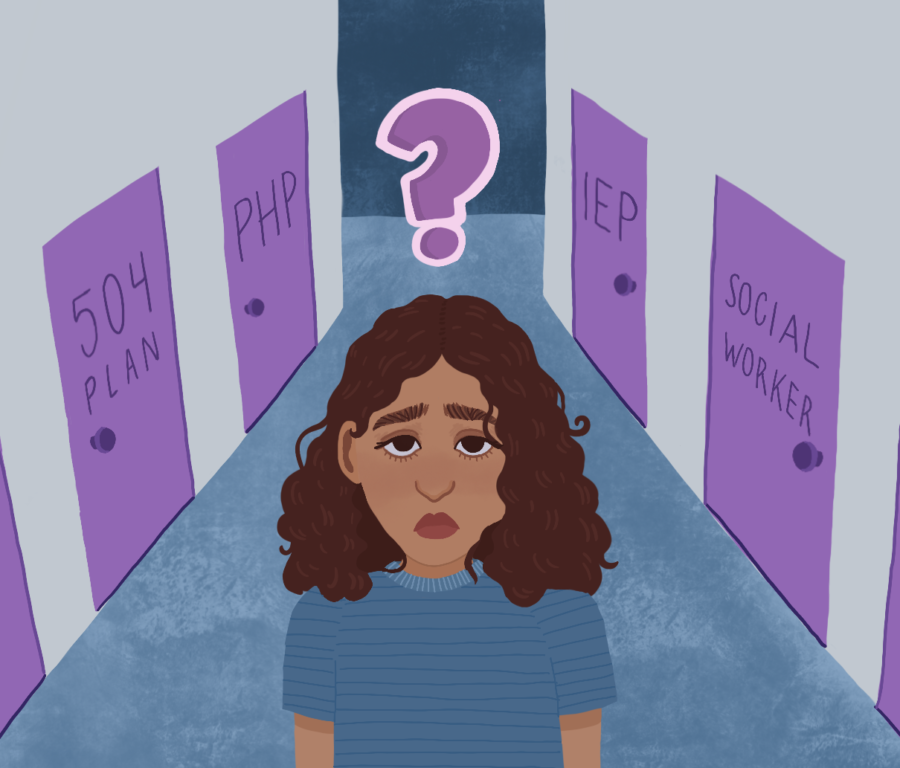Opinion | Teachers need to implement 504 plans better
On Dec. 6, 2022, an ETHS sophomore was stressed. COVID-19 cases were at their peak, school was more challenging than ever, and it felt like there was nothing they could do to elevate this anxiety. As the student stepped into the hallway on that winter day, the stress began to build up, and they fainted.
Following the incident, this student knew they wouldn’t be back in school for a while. They needed time to step away from class, while working through the anxiety that got them there in the first place. But when the student contacted the school with these concerns, they were left with nothing but blank walls.
“We had reached out to my counselor several times, trying to get this issue resolved. They didn’t give us responses to a lot of our emails, before we had to find alternative ways to get me out of school by ourselves,” the student notes. “They didn’t provide any support for what we wanted to do. We couldn’t find a single person who was willing to help us within the school, [so] we had to find it all entirely on our own.”
However, this student wasn’t the first one to feel entirely abandoned by ETHS during their time of need. Time and time again do students reach out to the school seeking support, and time and time again do their cries go unanswered. This experience did nothing but expose the sad truth: student wellbeing just isn’t a top priority for ETHS administrators.
In fact, in many instances, the school’s immediate response is to push the problem off to someone else.
“There are supports out there, and I know they are trying. They have counselors, they have at-home teachers, they have these resources, but I feel like there’s more effort that can be put into these programs,” the student elaborates. “Because the school right now is like, if you have mental health issues, contact this outside service. I feel like there should be more access to services within the school boundaries.”
Thus, for some students, the only step forward from this lack of immediate, in-school support is to acquire a 504 plan—a legal document that describes the services and accommodations a student must receive. Except, in order to implement this plan, families have to acquire diagnoses, recommendations and professional support—all things that require time, money and an abundance of resources.
“It’s so hard to actually get one. You have to prove that you need one enough. It’s kind of sad to know that all these special accommodations are kind of basic things, like ‘This student should be allowed to take breaks when they’re feeling overwhelmed.’ That should just be a basic right that all students have,” this student, who has a 504 plan, explains. “They shouldn’t have to go through this mountain of paperwork in order to get a basic human right. If a kid is feeling depressed, the first question shouldn’t be ‘where’s your diagnosis?’”
Even so, if a student is actually able to acquire a 504 plan, some teachers still manage to ignore these legally-sanctioned accommodations.
Another ETHS student experienced the worst of this neglect. In their 504 plan, the student is offered ‘self-limiting’ P.E., where they determine what activities they can and cannot participate in. Unfortunately, their P.E. teacher refuses to abide by this adjustment.
“We’re in the swimming unit right now. And I can’t do this; I shouldn’t have to explain to my teacher why I can’t do it. I just can’t do it. And if I can’t do it, whatever sport they’re doing, she’s not supposed to be asking me a bunch of questions. She still does,” the student reflects. “I think I have a D in her class right now, because she’s just giving me F’s, because I’m not doing the activities, and she’s not counting PERCC as a grade. We’ve talked to the administration about what I’m supposed to do here, and they don’t even know what to do. So they kind of just haven’t done anything, [and] this has been a problem that they’ve known about for basically the entire time I’ve had P.E..”
But this wasn’t an isolated incident for this student. At the beginning of their sophomore year, the student’s struggles with depression reached a point where they too had to leave school for a month. Despite being out of the building and entirely unable to complete any work, ETHS still asked them to make up the missing assignments upon return.
“I couldn’t do schoolwork for a solid bit of time, and I figured that the school would be pretty good with making it so that I can still have decent grades, even though I’m not able to come to school,” the student elaborates. “I actually ended up getting really bad grades for the first semester, because the school wouldn’t allow me to make up work, which was really confusing, because I wasn’t able to do work [while I was out of school].”
Yet, they weren’t alone in this intense expectation. After a month-long-break, the first student quoted in this piece faced discrepancies with how their different teachers handled the absence.
“[For] the teachers, it was kind of a 50/50 whether they really cared or not. Some of my classes, it was a total breeze. They taught me everything, [and] they gave me all the support they could. Other classes, it was far more difficult,” that first student says. “When I first came back to school, up until pretty much the end of quarter three, I still had 20 percents in some of my classes because I physically wasn’t able to keep up with the workload of all of my classes. I had to quickly complete all that I missed in a month, and it was hard to get them to change the grades.”
If this student just had different teachers for a few of their classes, their experience would have been a much more positive one. Instead of being forced to complete mountains of work after a mental health break, more of their teachers might have excused assignments and made themselves available.
Consequently, for the second student mentioned, this heavy workload and lack of compassion even caused them to drop a class— a transition that was anything but easy.
“I was also in Chem Phys, and I ended up dropping the class because it was just too much for me, and they said that I didn’t have to do any extra work to complete the course,” they reflect. “So, I assumed that I didn’t have to do anything. And a week later, they’re like, ‘Oh, yeah, you have to do all this work that you missed.’ It was basically an entire quarter worth of work, and I was already in a new chemistry class and everything. Part of the reason that I have issues is because of the stress of school and class, and it was all really frustrating and very stressful.”
Of course, most teachers don’t inherently have it out for these students, and no administrator wants their students to feel so stressed, but there still exists problems and discrepancies with how mental health cases are handled at ETHS.
“It’s kind of just, did you get a good teacher or not,” the second student quoted in this piece concludes. “Really, it’s kind of just luck.”
Your donation will support the student journalists of the Evanstonian. We are planning a big trip to the Journalism Educators Association conference in Nashville in November 2025, and any support will go towards making that trip a reality. Contributions will appear as a charge from SNOSite. Donations are NOT tax-deductible.




